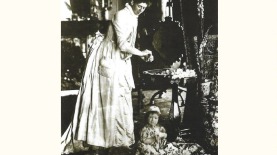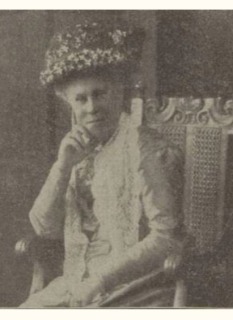
Exeter Women - and Men - and the Fight for Votes for Women Illustrated talk by Dr Julia Neville
On 13 June at Jurys Inn Julia Neville gave a fascinating account of the people here in Exeter and Devon who fought for women to have the vote.
In 1869 John Stuart Mill MP wrote “The Subjection of Women” declaring that women should be allowed to vote and relationships between men and women need-ed to be expanded. Voting was restricted to “male persons” and although there was not much unrest we were shown a map identifying 119 active suffragettes in Devon.
We were given descriptions of the women who put their lives on hold so that we, the women of the 21st century, could vote. First there was Deborah Castle, Lady Bowring, who promoted improved education for women. As a widow she objected to paying taxes and yet not having the right to vote!
Emmeline Pankhurst and her daughters’ slogan was “Deeds Not Words”. They set up the Womens Social and Political Union (WSPU) in 1903 specifically to be more proactive than the more gradualist NUWSS by interrupting meetings and gettiing arrested.
In 1906 the newly elected Liberal government, concerned about social reform (pensions and free school meals for the disadvantaged), did not have women’s rights on its agenda. However, the new Prime Minister, Campbell Bannerman, was not hostile to the movement and even advised that they should “keep pestering”! Unfortunately, he died after two years in office and his successor was not sympathetic to women having the vote.
In November 1907 Christabel Pankhurst addressed a meeting of the WSPU at Barnfield Hall in Exeter. The newspaper reports were more inter-ested in the car she arrived in than the words she spoke! This car belonged to Amy Montague from Crediton, an unusual and strong-minded woman who was said to enjoy mathematical puzzles before breakfast.
It was agreed that at the next by-election in mid-Devon women would make known their views and disrupt political meetings. Amy Montague, who had formed the Exeter branch of the WSPU, organised street meetings and was much honoured to be asked to speak with Christabel Pankhurst at the 1908 Hyde Park Rally.
Exeter’s various suffrage movements joined forces to work towards more equal citizenship and in 1928 this was granted.
We next turned to Jessie Montgomery (1851-1930) who had used her influence to make education and culture more available in Exeter. She persuaded Cambridge University academics to come to Exeter to give lectures and convinced the Royal Albert Museum (now RAMM) that they should provide a college of art and tech-nical training and also open a training college for women teachers (St Luke’s College then was just for male teacher trainees). In 1908 she set up a local branch of the National Union of Women’s Suffrage Societies (NUWSS).
In 1909 Lord Carrington came to speak at Victory Hall and stayed next door at the Rougemont Hotel. The police had the problem of escorting him from hotel to ven-ue with women “making trouble” in the street. WSPU members disrupted the meeting itself and three women, and the two men who helped them, were arrested and committed to five days in prison. They fasted, of course, but as it was only for five days no attempts were made to force feed them. When released, Amy Montague took them to her home in Crediton to recuperate.
We were then told about Edith Splatt (1873-1945). Probably because only men could qualify as tailors, she called herself a “scientific dressmaker”. Perhaps “scientific” meant that she worked by using patterns rather than a level of guess-work. She became a journalist, producing a women’s column for the local paper. Somehow she always sneaked into her articles at least a paragraph detail-ing suffragette meetings ! In 1921 she became the first woman to be elected as a City Councillor – on her third attempt...
Not all women were won over. Lady Acland from Killerton was anti-suffrage, insisting that a woman’s life role was to be in the home and garden parties/rallies for the anti-suffrage movement were held at Killerton. Interestingly, members of the next generation of Aclands were very much in favour of women’s votes!
A high proportion of NUWSS members were teachers and as a result the organi-sation had a distinctly educational flavour. In Sidwell Street they had a shop which provided literature, facilities to book places at meetings and even cups of tea.
It is important not to forget the many men who helped the cause. In particular there were Sir Robert Newman, later an MP for Exeter and Dr Edward Domville who spent much time working actively for the poor. One of the great advantages of having such men as members was that women who were not used to chairing meetings etc. could learn the skills by observing their male counterparts.
The Liberal government, still concentrating on their new welfare state, was not sympathetic to votes for women. Exeter’s MP, Henry Duke KC, excelled at sitting on the fence, wishing to be seen as sympathetic while in fact doing nothing. In 1910 the Liberals won another general election by joining forces with the Irish Nationalists – who wanted Home Rule
The WSPU became increasingly militant and in 1913 a warrant was issued for Mrs Pankhurst’s arrest. She was returning from the United States to Plymouth and, to avoid the crowds gathering to greet her ship, the police took a boat out to meet the liner at sea, arrested her and “smuggled” her up to Exeter Prison.
WSPU members picketed the prison and maintained a vigil outside. Mrs Pankhurst was not well and the Dean prayed for her in the Cathedral – not a popular move! And a pavement artist was arrested for producing a picture of Mrs Pankhurst on the pavement outside Barnfield Hall.
We turned to Adelaide Baly (1852-1941) a member of the NUWSS who in 1913 was the first woman to contest a City Council seat, one of only 40 across the country to do so. She was very involved with organising a pilgrimage from Lands End to Hyde Park which showed that the women’s movement was a national affair as many thousands joined the walk. In Exeter they stopped for a meeting in what is now the Triangle Carpark.
In 1914 the NUWSS asked members each to give a week to the cause to enable them to recruit new members by taking “caravan tours” to rural areas in Devon. However, all this ended once war was declared on 28 July 1914. The suffrage movements now concentrated on the war effort and many signed up as nurses or joined the army corps.
Mary Willcocks (1869-1952) had settled in Exeter and given up teaching to concentrate on writing novels. She joined the NUWSS who set up a toy factory to re-employ seamstresses laid off when their employers changed production to support the war. Children’s toys had mainly been imported from Germany and, now that source was cut off, teddy bears and other soft toys were produced here in Exeter and sold to stores such as Harrods in London. Mary Willcocks became very committed to the Peace Movement, lobbied for the rights of conscientious objectors and even stood at a by-election, though she lost.
At last, in 1918, came the Representation of the People Act which opened the vote to some women. The government felt that it had to proceed cautiously. As there were more women than men in the whole population (particularly when so many men had died in the war) there was concern that full suffrage could lead to women taking over parliament – even running the country !
Exeter’s various suffrage movements joined forces to work towards more equal citizenship and in 1928 this was granted.


